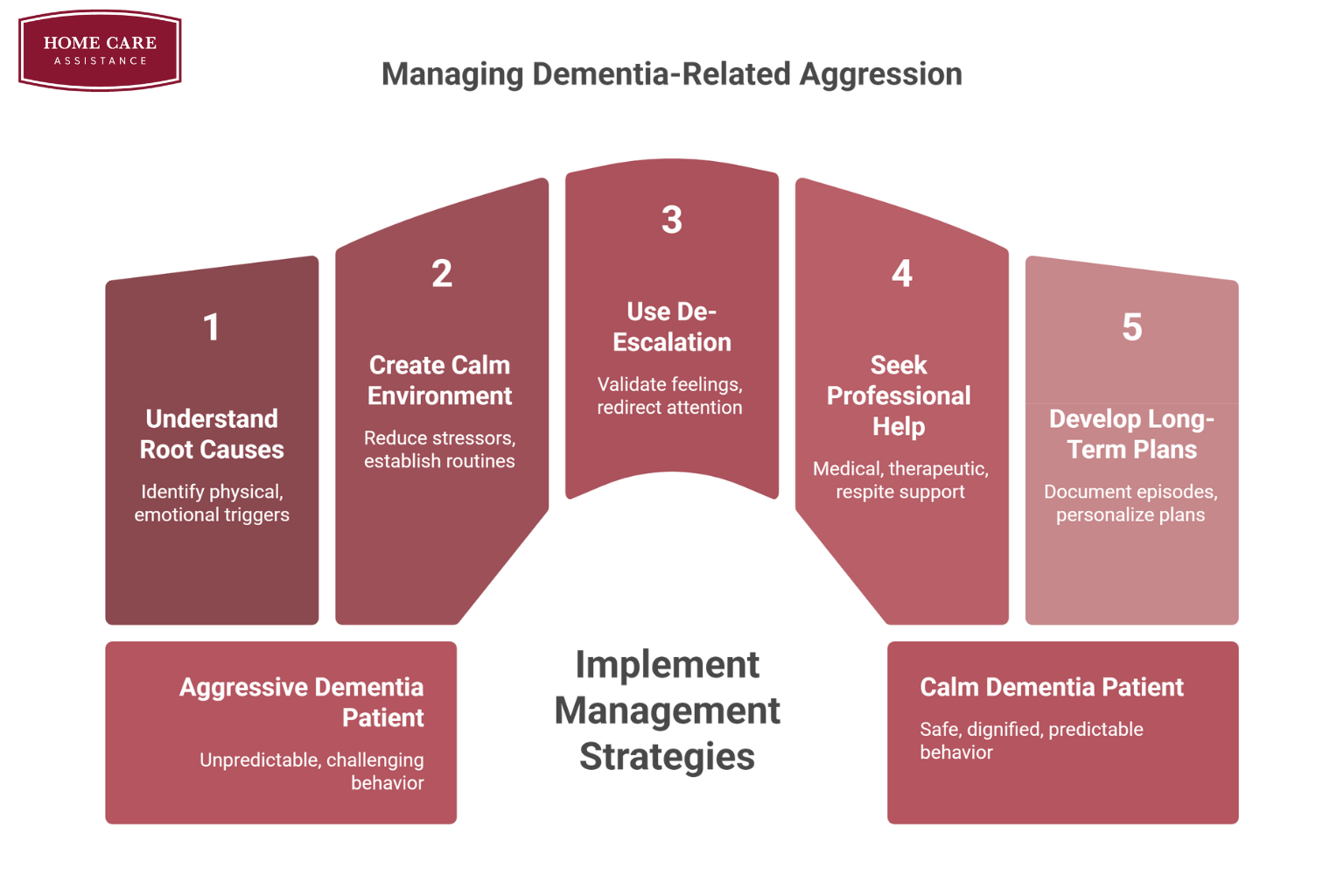Table of Content
Aggression in dementia patients can be one of the most challenging behaviors for families and caregivers to manage. Understanding the underlying causes and implementing appropriate strategies can significantly reduce aggressive episodes while maintaining dignity and safety for everyone involved.
Understand the Root Causes of Aggressive Behavior
Dementia-related aggression rarely occurs without reason, though the triggers may not always be obvious to caregivers. Physical discomfort often plays a major role in behavioral changes.
Common physical triggers include:
- Undiagnosed pain or illness
- Medication side effects or interactions
- Hunger, thirst, or bathroom needs
- Overstimulation from noise, crowds, or bright lights
- Fatigue or disrupted sleep patterns
Environmental and emotional factors can also contribute to aggressive responses. Changes in routine, unfamiliar surroundings, or feeling rushed can create anxiety that manifests as aggression. Additionally, the frustration of losing cognitive abilities and independence can lead to outbursts when seniors feel misunderstood or helpless.
The cognitive challenges that accompany dementia often leave aging adults unable to manage everyday tasks, which puts their safety and health at risk. If your senior loved one has been diagnosed with a serious condition and needs help with tasks like meal prep, transportation, bathing, and grooming, reach out to Home Care Assistance, a leading provider of elder care families can trust. We also offer comprehensive care for seniors with dementia, Alzheimer’s, and Parkinson’s.
Create a Calm and Predictable Environment
Environmental modifications can dramatically reduce the likelihood of aggressive episodes by eliminating common stressors and triggers.
Establishing consistent routines helps dementia patients feel secure and reduces confusion that can lead to agitation. Keep daily activities like meals, bathing, and bedtime at the same times each day. When changes are necessary, introduce them gradually and provide plenty of reassurance.
Physical environment adjustments include:
- Reducing noise levels and eliminating sudden loud sounds
- Maintaining comfortable room temperature and lighting
- Removing clutter and potential safety hazards
- Creating clear pathways throughout living spaces
- Using familiar objects and photographs to provide comfort
Consider your loved one’s personal history and preferences when designing the environment. Former teachers might feel calmer with books nearby, while someone who enjoyed gardening might benefit from plants or nature views.
Use De-Escalation Techniques and Communication Strategies
When aggressive behavior begins to escalate, immediate response techniques can prevent the situation from worsening and restore calm.
Effective de-escalation approaches include:
- Speaking in a calm, low voice and avoiding arguments
- Maintaining nonthreatening body language with relaxed posture
- Giving your loved one space and avoiding sudden movements
- Acknowledging your loved one’s feelings even if you don’t understand the cause
- Redirecting attention to pleasant activities or topics
Communication strategies should focus on validation rather than correction. Instead of arguing about reality, acknowledge emotions and redirect conversations toward positive memories or activities. Use simple, clear sentences and give your loved one time to process information before expecting responses.
Never take aggressive behavior personally. Remember the disease, not the person, is causing these reactions. Maintaining your own calm demeanor provides stability that can help diffuse tense situations.
Symptoms such as agitation, confusion, anger, and frustration are common in elderly people with dementia. Dementia can be challenging for seniors to manage, but they can maintain a higher quality of life with the help of professional dementia care. Opelika seniors can benefit greatly from the Cognitive Therapeutics Method (CTM), an activities-based program designed to promote cognitive health and delay the onset of dementia. CTM is included at no additional charge with any of the in-home care plans provided by Home Care Assistance.
Seek Professional Help
Some aggressive behaviors require immediate professional intervention to ensure safety for patients and caregivers alike.
Contact healthcare providers when aggression becomes:
- Physically dangerous to your loved one or others
- Frequent enough to significantly impact daily life
- Accompanied by other concerning symptoms like hallucinations
- Unresponsive to environmental modifications and de-escalation techniques
Medical professionals can evaluate whether underlying health issues, medication adjustments, or specialized interventions might reduce aggressive episodes. Sometimes simple changes like treating a urinary tract infection or adjusting medication timing can dramatically affect aggressive behavior.
Don’t hesitate to ask for help from support groups, respite care services, or professional counselors who specialize in dementia care. Managing aggression is exhausting, and caregivers need support systems to maintain their own physical and emotional health.
Develop Long-Term Management Plans
Successful aggression management requires ongoing assessment and adaptation as dementia progresses and care needs change.
Document aggressive episodes to identify patterns and potential triggers. Note the time of day, preceding activities, environmental conditions, and what techniques proved most effective. This information helps healthcare providers make informed treatment decisions and helps caregivers anticipate and prevent future incidents.
Work with your healthcare team to develop personalized behavior management plans that address your loved one’s specific triggers and responsive techniques. These plans should be shared with all family members and professional caregivers to ensure consistent responses across different care situations.
Regular plan reviews allow for adjustments as the disease progresses and new challenges emerge, ensuring management strategies remain effective and appropriate for your loved one’s current needs.
Caring for a loved one with dementia is a challenging task for anyone. The responsibilities can sometimes feel overwhelming, but help is available. Seniors can face a variety of age-related challenges. Though some families choose to take on the caregiving duties, there may come a time when they need a trusted Opelika home care provider. Families sometimes need respite from their duties so they can focus on their other responsibilities, and some seniors need around-the-clock assistance that their families are not able to provide. Home Care Assistance is here to help. Contact one of our experienced Care Managers today at (334) 744-7100 to learn more about our reliable in-home care services.

